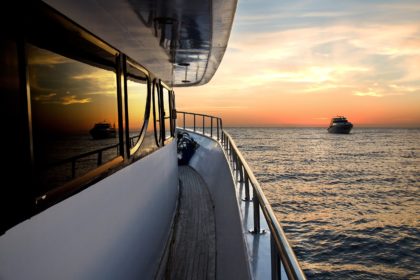Since 1989, Anchor Marine has been dedicated to finding our clients the best combination of coverage and price. When it comes to insuring your vessel, it is often difficult to know what you are buying up front. Below is a quote example and terms you will find on your quote. Please click on the individual terms below to learn more.
Sample Vessel Description : 2022 42’ Motor Yacht
Property Damage $450,000
Deductible(s) $4500
Liability $1,000,000
Oil Pollution/Accidental Fuel Spill $977,100 (Statutory)
Medical Payments $25,000
Personal Property $25,000
Emergency Towing $5,000 (No deductible)
Uninsured Boaters $1,000,000
Longshore & Harbor Workers Statutory
Coverage Definitions
-
This coverage is for the vessel itself and attached electronics. Policies which you purchase from a marine specialist are usually “all risk” coverage at a pre-set “agreed value”.
The “agreed value” is either the purchase price or survey value. “All-Risk” means that you have coverage unless the loss is specifically excluded. Claims may be weather related, fires, collision and groundings. Unlike your auto policy, there is no difference between collision and comprehensive coverage, and you have a percentage deductible which ranges from 1-5 percent. Loss settlement clauses are also important as you need to know what will be depreciated. “Agreed value” cover is preferred versus “Actual Cash Value (ACV)”. ACV is defined as: the amount equal to the replacement cost minus depreciation of damaged or stolen property at the time of the loss.
Remember that damage from an uninsured boater is a physical damage claim. Your deductible applies, however, better polices may waive it under certain criteria. Broader policies may also cover latent defects and differ on how the handle machinery claims.
-
Personal property coverage can be at replacement cost (new for old), Actual Cash Value or even excess coverage over other insurance.
Personal property under a marine policy may include the following:
Clothing apparel
Sports equipment
Fishing equipment (including fish finders)
Other personal property items not otherwise excluded
See below for what is not considered personal effects as they are usually part of the boat:
Furniture
Radios or stereos
Navigation equipment
TVs and similar electronics
Your towing needs to be equal to greater than an average tow bill where you normally boat. Remember that this is emergency towing. This means that you are stranded out in the water versus being at a safe port.
-
Liability exists when you are responsible to property damage or injury which arises out of the ownership or operation of your vessel. When a fire happens, the vessel where the fire started may be legally liable for damages to the marina, fuel spill expenses and other boats. Policies vary on how pollution limits work. Oil pollution can be included in liability or have the maximum set as the greater of the two. You can be liable under the Oil Pollution Act of 1990 for up to $997,100. Oil pollution/fuel spill is always excluded under a personal umbrella.A good policy will also cover your liability under the Federal Longshore and Harbor Workers’ Compensation Act. This will cover any statutory liability to a temporary worker such as a mechanic or marina employee if they are injured on your boat. Wreck removal (on most policies) is covered under the liability limit as well.
-
This is coverage for medical bills in the event a guest is injured on your boat, even if you are not legally responsible.
-
This coverage is designed to compensate you for injuries if the legally liable boater does not have enough insurance or does not have insurance at all. It does not cover damage to your boat.
-
Factors for rate differences include the following:- Value
- Age of your vessel
- Length
- Condition
- Credit score
- Navigation
- Lay-up credits
- Safety devices
- Engine type
- Boater experience
- Hull material
Remember that on boats 26’ and over a survey may be required for new business depending upon age of your vessel. Surveys are recommended periodically but company future survey requirements need to be considered when making your insurance buying decision.
IMPORTANT NOTE: This summary provides only a simplified description of insurance coverages in general and is not a statement of contract. For complete details of coverages, conditions, limits and losses not covered, be sure to read the actual policies, including all endorsements.

